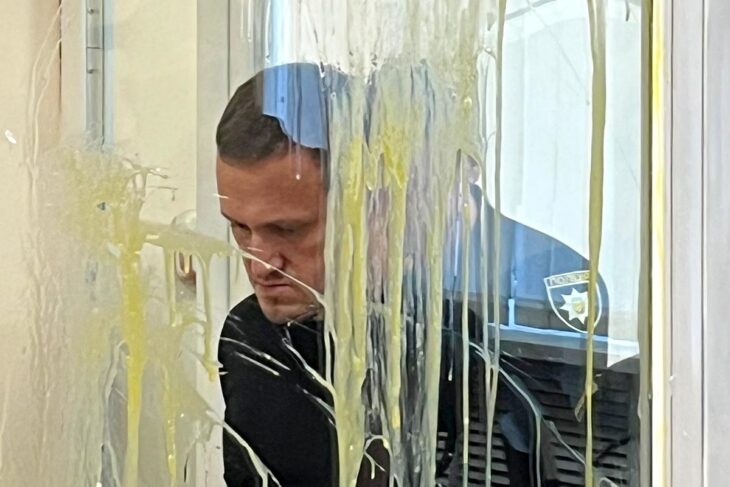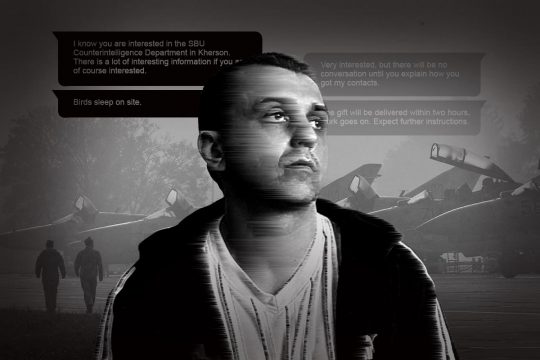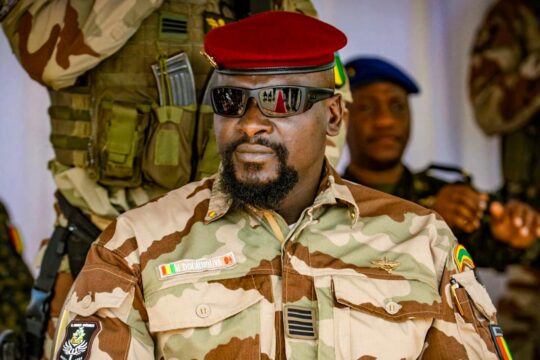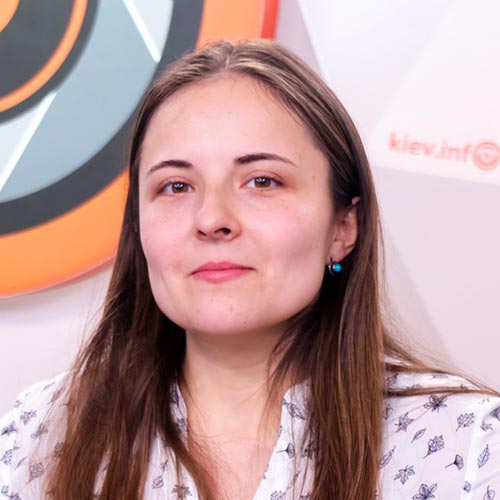The level of tension in the criminal case against Gennadyi Herman was quite high from the start. Early in the trial that started in October 2022, a fake story began circulating on social media suggesting that the court in Mykolaïv had already sentenced Herman to life imprisonment, but that his lawyers had obtained a review of the sentence in the Prymorskyi Court of Odesa. Such procedure is impossible from a legal point of view but the rumor set the tone and gave a sense of the sensitivity of the case in Ukraine. Eventually, on June 28 the court in Odesa did sentence the former head of the Mykolaïv District Prosecutor's Office to life in prison. This is the first time an official of this rank has been tried for high treason during the full-scale war.
According to the prosecution, in early March 2022, soon after the full-scale invasion of Ukraine by Russia, Herman reached out to the administrator of a pro-Russian Telegram channel and asked for his personal contact information. The administrator turned out to be a Russian propagandist with a Ukrainian passport, Yuriy Podolyaka. Herman allegedly disagreed with the Ukrainian government's information policy, aspired to Russian occupation and hoped for a leadership position in the event of the takeover of Mykolaïv by the Russian army. And therefore he offered his assistance to the “blogger”. In his correspondence Herman is accused to have put forward his influence on local law enforcement officers and, in the event of occupation, that he would convince them to betray their oath of allegiance to Ukraine.
Podolyaka immediately instructed Herman to provide all the information at his disposal in his capacity as the head of the Mykolaïv District Prosecutor's Office regarding the military situation in Mykolaïv and the region. And the blogger forwarded the information he received to Lieutenant Colonel Igor Bezler of the Russian military intelligence service.
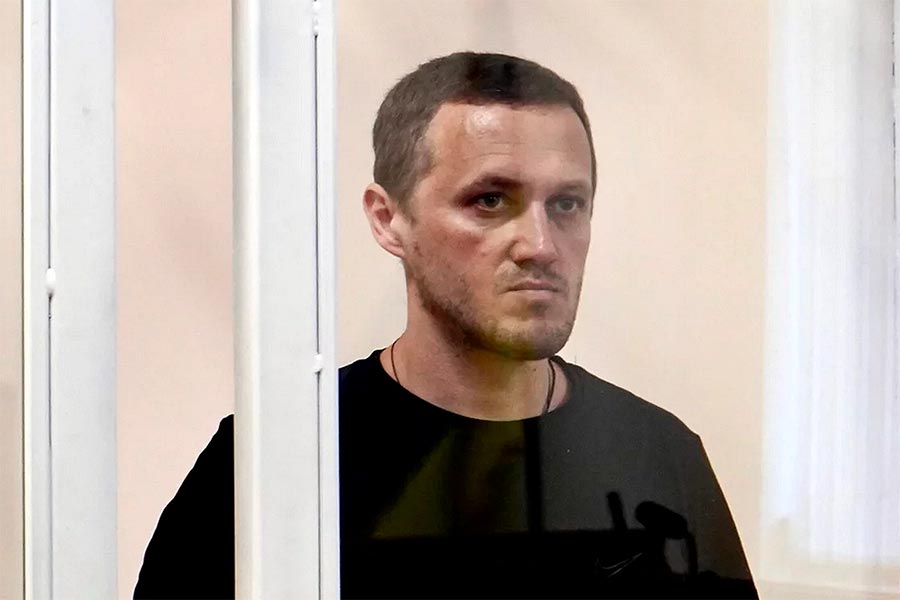
Disclosed information
The data included up-to-date information on Russian military personnel and members of illegal armed groups and sabotage and intelligence groups who had been captured in Ukraine, and information on the number of casualties among Ukrainian soldiers, police officers and civilians.
At the end of February 2022, the National Police Department in the Mykolaïv region initiated a criminal investigation over the deaths of Ukrainian soldiers and civilians in the first days after the Russian invasion. Lists of the dead had to be made in order to identify the bodies and release them to their families for burial. Herman was the procedural supervisor in this case and, as police officers and prosecutors later testified, was constantly receiving updated information. He allegedly passed on this information to his Telegram contact.
Herman also sent personal observations regarding the work of law enforcement agencies in the region, the social and operational situation in the city - the condition of bridges, the traffic on major roads, the mood of current and former law enforcement officers, etc. He provided information on the registration of prisoners of war and the facilities for them in penal institutions, indicating the name of the institution, its address, the number of people in it, the full names of the heads of such institutions and their mobile phone numbers.
On March 30, Herman sent an image of the operational report of the Mykolaïv District Police Department N°1 on the consequences of the deadly rocket attack on the premises of the Mykolaïv Regional Military Administration, indicating the date and time of the attack, the number of dead and injured persons, including the details of the affiliation of the deceased with a specific military formation or law enforcement agency.
He provided Podolyaka with passwords for passing the checkpoints in Mykolaïv and the region as well as the updates of these passwords. And on April 4, the prosecutor sent information on the results of the work of the State Emergency Service in the Mykolaïv region in dealing with the consequences of Russia’s armed aggression - data on the number of cases in which the State Emergency Service was deployed to a particular district or street location, the number of damaged properties, the number of injured and killed victims, including military personnel, the number of defused explosive devices, the number of reported citizens' statements on such cases, and the number of communities cut from electric and gas supply.
A trap set up by Ukraine’s intelligence services
Later that day, Herman was arrested. As it turned out, the prosecutor was under surveillance. The Security Service of Ukraine (SBU) had extracted information from the Telegram account and read Herman's correspondence. A criminal investigation was opened on March 15, 2022. To prove that the information was being leaked, the investigators arranged for Herman to receive fake documents, including a list of four killed Ukrainian soldiers and information about the work of the State Emergency Service in the Mykolaïv region. They involved one of the chiefs of the Mykolaïv region police and an official of the local State Emergency Service in confidential assistance, in order to provide such fake information to Herman.
From March 15 to April 4, 2022, Podolyaka had received from Herman the following files: "List of prisoners", "Situation in Mykolaïv", "Facilities for prisoners of war", "Civilian casualties", "Regional State Administration 03.04.22_15 30". During the pre-trial proceedings, Herman did not deny that he had passed the information to Podolyaka but said that he had sent the information to a blogger he had found on the Internet in order to provide objective coverage of the situation in Ukraine.
“Revenge on traitors”
The relatives of Ukrainian soldiers who died in the missile attack on the barracks of the 79th separate airborne assault brigade of the Armed Forces of Ukraine in Mykolaïv on March 18, 2022 – where at least 50 people were killed - began to attend the court hearings, holding portraits of the victims. They accused Herman to be responsible for the death of their beloved ones. However, the indictment does not mention the bombing of the barracks as a result of Herman's tip-off and the relatives of the deceased soldiers were not acknowledged as victims in this case. Yet they eventually convinced the court to make Herman's trial partly public.
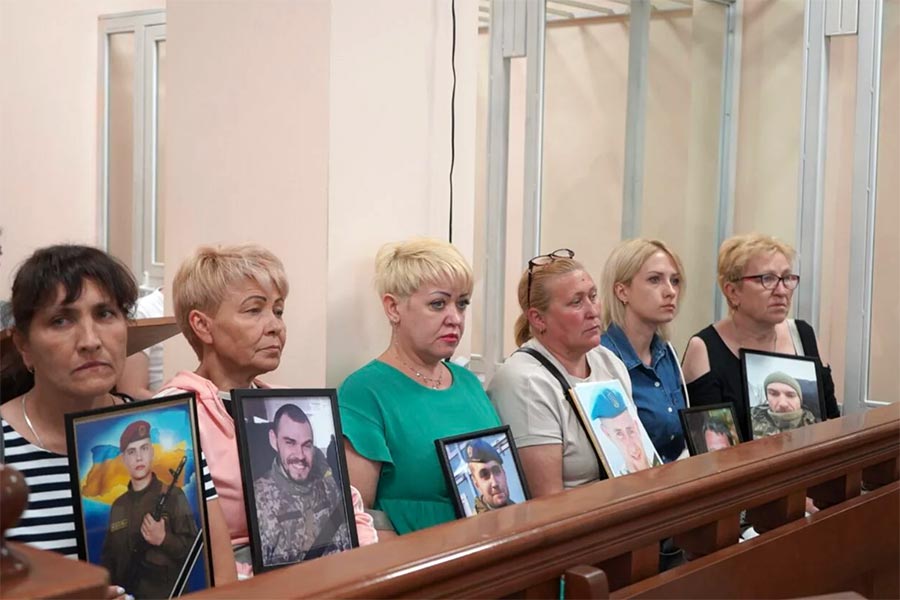
Oksana Rutska, head of the NGO Human Rights Protection Group, lost her 25-year-old son Mykola Novikov in the attack. She brought together people who, like her family, were looking for information on social media about the missing persons after the shelling of the barracks. They created a Viber group called "Revenge on traitors", which includes more than 80 members who have already buried their dead and are demanding that the perpetrators be punished. Another group, "Mykolaïv Barracks", brings together those who still hope that their relatives are alive and might be in captivity.
As Rutska told us, her son served in the presidential regiment on conscript duty and tried his hand at being a ship's cook. Six months before the full-scale invasion, Novikov signed a contract to join the Marines and was sent to training in Chaplynka, in the Kherson region. This is where he faced the great war when on the morning of February 24, the Russians started shelling the military camp. The enemy was advancing rapidly, and a couple of days later Novikov and his fellow soldiers were transferred to defend Mykolaïv.
Horror at the barracks
"The last time we heard from our son was on the 17th [of March] between 11 p.m. and midnight,” recalled Rutska. “He said: ‘We’ve come back from a mission, we are exhausted, we are going to sleep, and tomorrow morning we will go on another mission. There were fierce battles near Voznesensk, near Snihurivka, and it was our guys who fought back in Kherson direction.’ When he stopped contacting us on August 18-19, we thought he was on a mission and was not allowed to use his phone. We could not imagine such a tragedy. Then we learned from unofficial sources about the explosions in the barracks. We started calling the military unit, the morgue, hospitals... We received a reply that the Marines were on a mission and that they could not be reached. I got in touch with the head of the territorial defense of Mykolaïv. He assured me that the 137th battalion was not in the barracks, that they were on a mission. We calmed ourselves down for a few days. And then, when I read a lot of messages on Facebook saying "we are searching", "we are searching as well", "the last contact was on the 17th", I told my family that we were not going to wait any longer. On the 25th, we went to Mykolaïv. The city was under heavy shelling. We were driving to the hospitals looking for him, we didn't think there could be such horror. But we passed near the morgue and I said, "Let's go in to make sure he's not there. The three of us were there - me, my husband, and my daughter-in-law,” Rutska said.
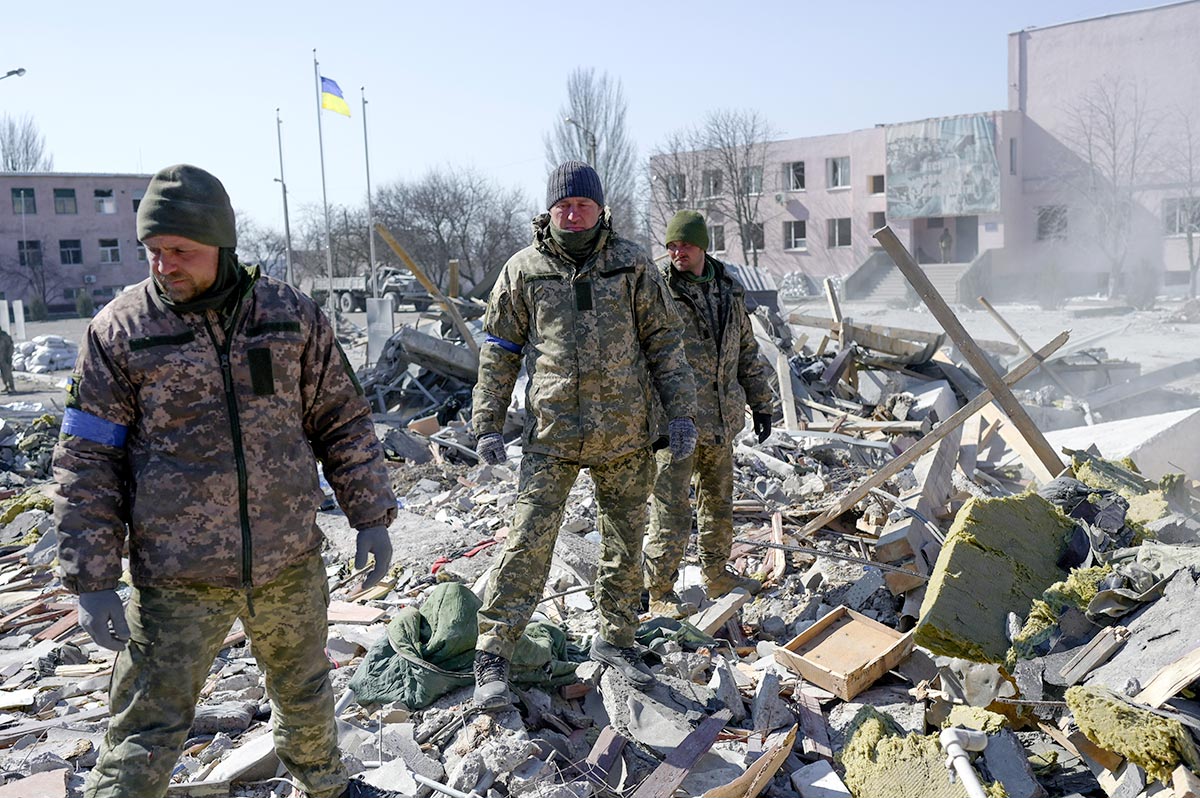
“There were four hangars and the young men were lying in rows on the floor,” she continued. “We had to walk by them to be able to identify them all. Some of them had arms and legs severed, bowels in bags... The first thing that struck me was mothers sitting over the corpses of their children and screaming. It was terrifying. We didn't find him in the first hangar, although we turned some of the bodies over to look at them because some were burnt, some were missing their heads, in pieces... When we went to the second hangar, he was lying there without a face, a bag over his head. We passed by him. And then, when we were coming out, my husband froze, as if he felt something. There was a chunk of his beard... I saw a ring on his hand. My daughter-in-law cleaned it with a handkerchief and started screaming because she gave him that ring as a gift and knew what it looked like. That's how we found him. No one told us anything, no one called us. If we hadn't come on our own, we probably wouldn't have found him to this day. Some mothers are still looking and hoping that their children are in captivity. They have given their DNA, but do not recognize what they are shown. Some bodies are still being stored in the morgue in Mykolaïv. There are about 20 families who have not yet buried their children because they think those are not their loved ones."
Who’s fault?
Vitaliy Saluk comes to court hearings with a portrait of his 22-year-old son Andriy. The young man served in Mykolaïv on a contract basis. On February 26, his contract expired, but the full-scale Russian invasion had begun and everyone automatically stayed in the army. After the attack on the barracks, the father searched for his son for six months. He gave his DNA samples three times. The first time, the experts committed a mistake; the second time, the DNA samples never reached the laboratory for analysis. Only in September of last year was the young man buried.
Ihor Guzenko is the father of 19-year-old soldier Vladyslav, who volunteered to join the army on February 27, 2022. On March 14, he was leading Ukrainian soldiers out of an ambush near Kherson, and on the 18th he was killed. "The authorities say that before sending conscripts to the front line, they are sent to training... There was no training, nothing. He was a machine gunner on a "Kozak" [an armored vehicle]. An untrained child of 19 years old on a combat vehicle is complete lunacy," Guzenko said.
Three criminal cases are currently under investigation into the bombing of the barracks in Mykolaïv. The SBU is looking for the Russian pilots who fired the missiles and their commanders. The Main Investigation Department of the Mykolaïv National Police is investigating premeditated murder, and the State Bureau of Investigation is verifying the possible misconduct of Ukrainian army officials who allowed soldiers to sleep in the barracks even though they knew that there had already been airstrikes on the barracks. Oksana Rutska, monitoring the investigation, says that there are very few witnesses to the events. The soldiers who survived the bombing of the barracks were sent to the front line and it is impossible to summon them to testify, and some are afraid to say anything when it comes to their direct superiors.
“Against the wall and that’s it!”
Rutska says that Herman does not react in any way to the victims’ parents. "He drops his eyes to the floor and that's it. Because the parents are shouting and cursing. And what kind of reaction can you have to a person who was involved in the deaths of your loved ones? As for the court's questions, he answers them briefly," she says.
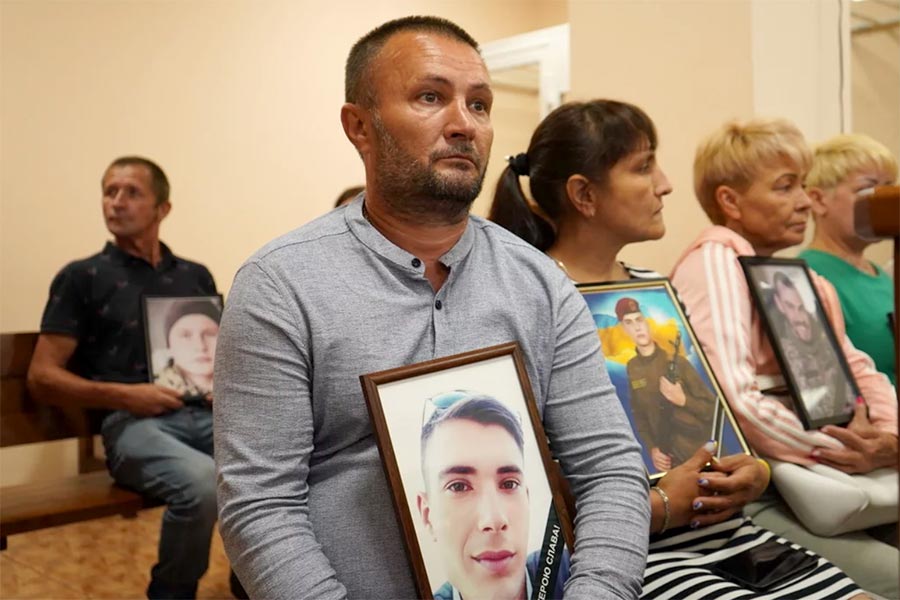
At one hearing, people waited outside the courtroom for about an hour, while Herman was interrogated. The accused refused to give explanations in the presence of the public. People were allowed back in the courtroom to listen to the closing arguments.
"I would not have dragged this out for long. I would have called a bunch of reporters and television and handed [Herman] over to the parents,” says Guzenko in the court corridor, waiting for the verdict. “And the next person who would think of betraying the homeland or making strike corrections would have to consider it very carefully. This trial has been ongoing for a year and a half. He lives on state-funded food. They bring him in, take him back... I didn't live through Stalin's time, but I know what it was like. Step against the wall - and that's it!"
Herman’s changing stance
Upon the insistence of the parties to the proceedings, the materials of the undercover investigative and search operations, which were supposed to shed light on Herman's communication with Podolyaka, were examined in a closed session. The prosecutor explained that information about the methods of law enforcement agencies and undercover information gathering should not be made public. The examination of Herman's personal life and his interrogation were also conducted behind closed doors.
In open court, prosecutor Oleksandr Choklya said that Herman repeatedly changed his testimony in an attempt to mislead the court. During the pre-trial hearing, as well as during the establishment and extension of the preventive measures, he did not deny passing information to Podolyaka, Choklya noted. However, the accused said that he considered Podolyaka to be a blogger and journalist. The prosecutor also said that during his interrogation in court Herman suggested that the information could have been sent by other persons who had access to his mobile phone. But during the interrogation, as well as during the final pleadings in public, Herman stated that he didn't know Podolyaka at all and that he might only have watched his videos on Youtube a couple of times. "I did not commit high treason. I don't know Igor Bezler and Yuriy Podolyaka, I have never met them, I have never talked to them. I did not send them any documents. I do not consider myself guilty. I ask for a lawful and fair decision," the accused said.
Did the information qualified as “secret”?
In court, defense lawyer Stanislav Klymenko said that not only Herman's guilt was not proven, but that it was also refuted by the case file. The defense believes that the disclosure of information can only constitute high treason if the information is a state secret. If the information is considered to be internal service information, the criminal offense should be charged under Article 330 of the Criminal Code (transmission or collection of internal service information obtained in the course of operational and investigative, counter-intelligence or defense activities). This offense is subject to a maximum sentence of 8 years in prison.
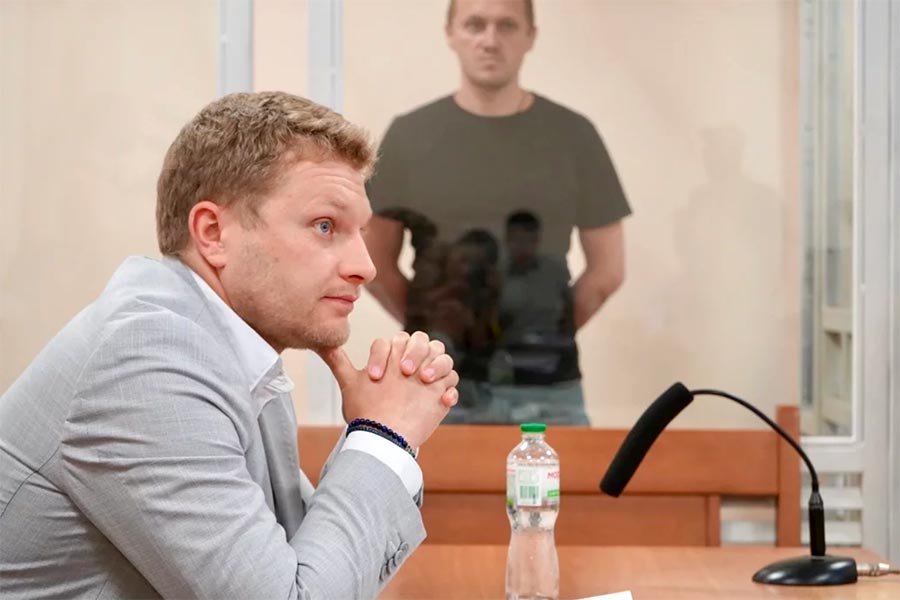
"The indictment does not include any references to the legislative definition as to whether the information allegedly passed by Herman is a state secret or a internal service document... There are no criteria for what kind of information helps a foreign state to conduct subversive activities against Ukraine. And, unfortunately, it is not the law but the pre-trial investigation and prosecutor's office employees who determine this matter at their own discretion. This approach is arbitrary. The established practice of the European Court of Human Rights regarding the clarity, precision and consistency of the law has been violated... The prosecutor qualifies as high treason the transmission of information that, in the opinion of the investigation, harms defense capabilities, but at the same time does not represent neither state secret nor internal service information," the lawyer said.
Prosecutor Andriy Milevsky explained that Herman is not charged with high treason through espionage, which requires the transmission of classified information. Instead, it is a case of assisting a foreign state in subversive activities against Ukraine, which can occur in various ways. The Criminal Code has no definition of subversive activity, providing a range of subjective interpretations. During the arguments, the prosecutor acknowledged that subversive activity is an evaluative concept, but insisted that the guilt of treason has been proven.
The role of Podolyaka
Blogger Podolyaka is a citizen of Ukraine. According to the defense lawyer, the prosecutor failed to provide evidence that Podolyaka represents the Russian Federation. In fact, the proof of such representation should be a contract, or an act of a legal entity. Podolyaka is being tried in absentia in Vinnytsia, in Western Ukraine, for justifying an armed aggression, but there is no verdict yet. According to the defense, there is no evidence that Podolyaka collaborated with the Russian Federation or provided information to the Russian Federation.
The defense also refutes the fact of sending the information. The examination of the mobile phone and the findings of the computer forensic examination did not establish any interaction between Herman and Podolyaka in a question-and-answer mode, the defense argued. "The mere fact that Herman had the files in his possession which, according to the prosecution, were later transmitted by Podolyaka to [Russian colonel] Bezler, cannot indicate that such files were sent to Podolyaka," Klymenko said.
During the pre-trial investigation, 23 other persons who had access to such information were identified. But the prosecutor decided not to question them all in court.
Defense asks for acquittal
The defense counsel Vladislav Kalanzhov asked the court to acquit Herman of all charges, or consider to change the qualification of Herman's actions and sentence him to a less severe punishment. If found guilty of high treason in time of war, he asked that the minimum sentence of 15 years in prison be imposed. The prosecutor denied the defense's arguments, saying that the direct transmission of information by Herman to Podolyaka was proven. They had repeatedly communicated on Telegram, with Herman being the initiator. According to the prosecutor, the transmitted information did not contain publicly available information, but rather information that Herman received in his senior position in the prosecutor's office. In order to confirm the transmission of such information, fake documents had been produced and, as a witness involved in the undercover investigation said in court, the information concerning the work of the State Emergency Service was not shared with anyone else but Herman.
Throwing eggs at the accused
During a break after the closing arguments, people could not keep their emotions hidden. "Remember what you said when they were arresting you? Bastard! That you wanted to work as a prosecutor in charge of the “ruscists” [Russian fascists]. You have one goal, one motive. That’s why you leaked our positions, betrayed our boys. Human rights! What about our rights – parents’ rights? The rights of our children to live?” shouted parents of the fallen soldiers in the hall.
The audience does not understand how anyone has the audacity to be Herman’s lawyer. "My son had a three-week-old baby, and you are defending a scumbag like that," a crying woman shouted at counsel Klymenko, who was standing in the distance, seemingly ignoring her while talking on the phone.
After about an hour and a half, everyone returned to the courtroom. The verdict was pronounced. Herman was sentenced to life imprisonment with confiscation of property. As always, he listened without showing any emotion. The relatives of the victims wiped their tears. Herman was told that he could file an appeal and get acquainted with the case file. "In addition, for the sake of procedure, you have the right to be pardoned," Judge Osiik told the accused. This statement provoked discontent in the courtroom. "What do you mean, pardon?" said a victim’s relative. The court session was adjourned.
"Glory to Ukraine! Death to the enemies!" With these words women threw eggs at Herman. The yolk spread across the glass cabin. "Thank you so much, Judge! May you die, you scum! Glory to the heroes! And death to the enemies of Ukraine!" the women shouted. Someone played the Ukrainian national anthem on his phone. "Execute him in prison! You betrayed the country, you bastard!"
The eggshells were then swept onto a scoop, and the same women who had thrown the eggs cleaned the stained cabin with napkins. "We have nothing left to lose, we have already lost the most important," they said, crying.
This report is part of our coverage of war crimes justice produced in partnership with Ukrainian journalists. A first version of this article was published on the "Sudovyi Reporter" website.


